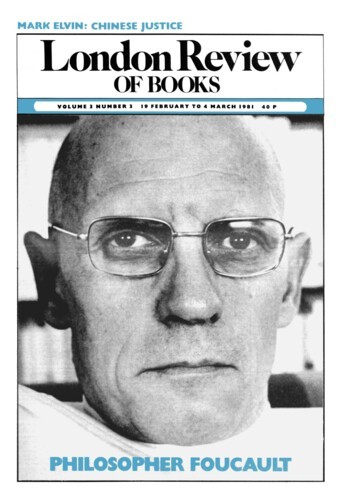Coping
David Armstrong, 19 February 1981
Michel Foucault has of late become something of a cult figure in the Anglo-Saxon world. His critics can point out that he has the necessary qualifications for guru status, in that his writings have tended to be cross-disciplinary, obscure and fairly opaque. Yet his work has recently taken on a new clarity and, moreover, he has acknowledged that in his previous studies he had missed an important explanatory variable – namely, ‘power’. In essence, Foucault now argues that the 18th century saw a shift in the nature of power, from a system based on sovereignty to one based on discipline. In the former, power radiated from the personage of the king and through his representatives, courtiers, magistrates and officers directed itself to the body of his subject. This system of power can be illustrated by the various techniques of punishment which involved a public display of violence to the criminal’s body, as in executions, torture and floggings. Within a few decades, however, the criminal found himself not in public, but alone in a cell, and subjected, not to physical attacks, but to constant surveillance. The prison, Foucault argues, was a device of disciplinary power in which the exposure of the criminal’s body to observation instilled a sense of discipline. This new invention in the ‘technology of power’ found its ideal expression in Bentham’s Panopticon and its usefulness in the prisons, schools, hospitals, barracks and workshops that were built throughout the 19th century. Each of these institutions, through their internal configurations, allowed bodies to be constantly visible to an observing ‘gaze’; and appropriate techniques – inspections, clinical examinations, investigations and the like – were devised to further the analysis of these individualised bodies. The body was both the object of the gaze and, more important, an effect: constant surveillance served to constitute the body as a discrete object and to fabricate a personalised individualism. The individual, in Foucault’s words, was both object and effect of power.

